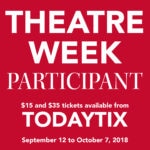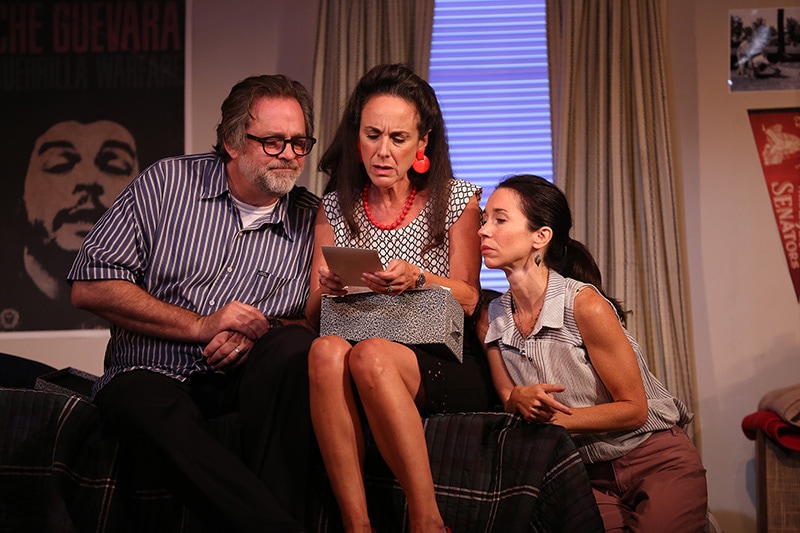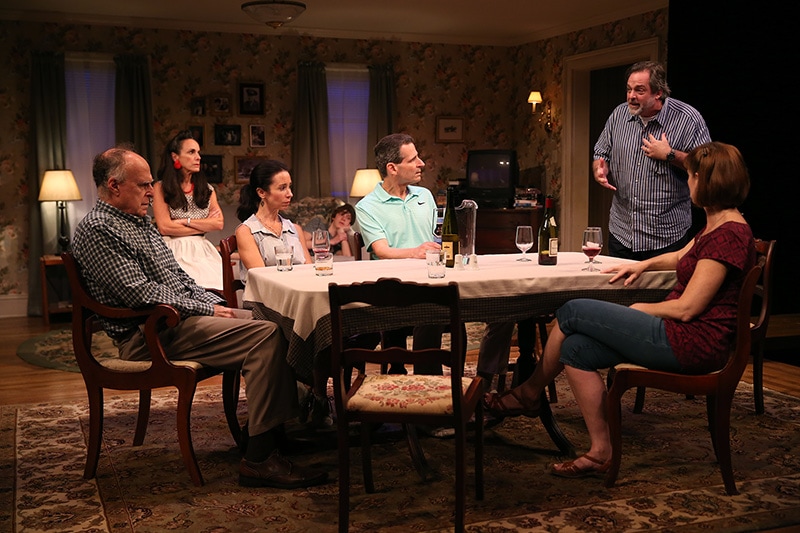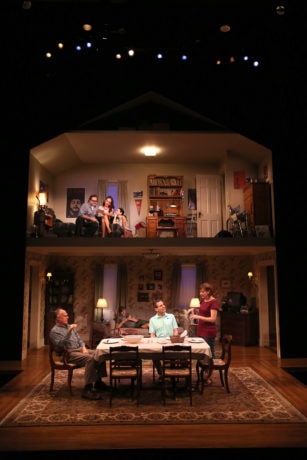
First, it must be acknowledged that Steven Levenson’s If I Forget, just opened at Studio Theatre in a production directed briskly and cuttingly by Associate Artistic Director Matt Torney, is indisputably well made. The playwright is quoted in a program note by Dramaturg Lauren Halvorson, “I wanted to write a play that was a real, intimate family drama, an old-fashioned kind of realistic play that could also, somehow, hold a lot of ideas.” In this, Levenson has succeeded superlatively, because If I Forget is a tightly packed drama of family conflict so funny, sad, and explosive it leaves one knocked out and wrung out by the end—not unlike the way family meltdowns tend to do in real life.

All the familiar conventions of great domestic drama are in play: A mismatched set of grown siblings separated by distance and temperament (in this case, two sisters and a brother who grew up in a Jewish family in Tenleytown). The occasion of some celebration or crisis that brings them together accompanied by assorted mates (the 75th birthday of their widowed father). Revelations of resentments and betrayals and arguments about everything (oy). A final scene of poignance purporting to be closure (here a theatrical evocation of a Jewish ritual).
Read my colleague David Siegal’s review of If I Forget.
Jumping ahead to Act Two for a moment (I know, an odd way to look at a play), it’s seven months after Act One and (without giving too much away) the characters are variously in the throes of: a major health collapse, a major career collapse, a major financial collapse, major childrearing struggles, and a bitter dispute over whether to cash in on an inheritance. And curiously all these Act Two intrafamily dramas seem not particularly Jewish at all.

It’s Americanized Chekov meets assimilated Neil Simon. The several story lines are riveting. And the act plays vigorously, not least because all seven parts are performed with such distinction: Richard Fancy as the avuncular paterfamilias Lou Fisher, Susan Rome as the persnickety daughter Holly Fischer, Jonathan Goldstein as the renegade son Michael Fischer, Robin Abramson as the putupon daughter Sharon Fischer (caretaker to Lou), Julie-Ann Elliott as Michael’s forbearing wife Ellen, Paul Morella as Holly’s milquetoast husband Howard, and Joshua Otten as Holly and Howard’s wayward son Joey.
It’s not that the extended Fisher family’s problems could be any family’s problems—there are obvious parameters of class, education, and color that distinguish their relatively privileged woes. But there’s not much in Act Two that makes it a Jewish Act Two except the final ritual scene (which plays a little like a wrap-up afterthought).
One actually has to recall what Levenson does in Act One to appreciate what makes If I Forget a singularly volatile and disruptive Jewish play. Michael, a college professor, has authored a radical and controversial book titled Forgetting the Holocaust—a deliberate provocation that is being read as an affront to everything Jews mean when they say “Never again.” Michael sent the book in manuscript to Lou, who, we learn, loathes it. A petition is circulating at the school where Michael teaches to block his shot at tenure. Even Michael’s own sister Holly thinks the book is anti-Semitic. All of which is Levenson’s wind-up to the speech in which Michael gives a searing summary of his book. Michael argues that Jews have forgotten the real lesson of the Holocaust, which is that the global problem is nationalism, of which anti-Semitism is a subset. The Holocaust isn’t over, says Michael. It keeps happening, for instance in Rwanda and by implication to Palestinians. Michael’s monolog is magnificently written and delivered, showstopping to this goy and, as I imagine, heart-stopping to any Jew, wherever he or she may fall on the spectrum between secular shame and Zionist hubris.

Then just when one might think that speech by Michael is untoppable, Levenson has the father Lou weigh in with an equally searing monolog recalling his experience as a soldier in World War II among the Americans who first entered Dachau. The eye-witness account he gives is unbearable to hear, much less picture, and Levenson’s writing and Richard Fancy’s performance tear the play apart. In between two majestic pillars of conscience—Michael’s indictment of Jews’ self-referential memory versus Lou’s survivalist insistence on it—Levenson pitches the audience into perhaps the most profound contradiction facing Jews today.
And just as in real-life families when a political controversy erupts before intermission, it gets glossed over afterward, the subject gets changed, and generic family drama resumes. Because that first act controversy was so charged and so distressing, no one wants to talk about it anymore.
I’m going to go out on a limb here and say that If I Forget may be one of the greatest Jewish plays of this century. And for that reason alone it must be seen.
Running Time: Two hours and 45 minutes, including one intermission.
If I Forget plays through October 21, 2018, at Studio Theatre – 1501 14th Street NW in Washington, DC. For tickets, call the box office at (202) 332-3300, or purchase them online.




